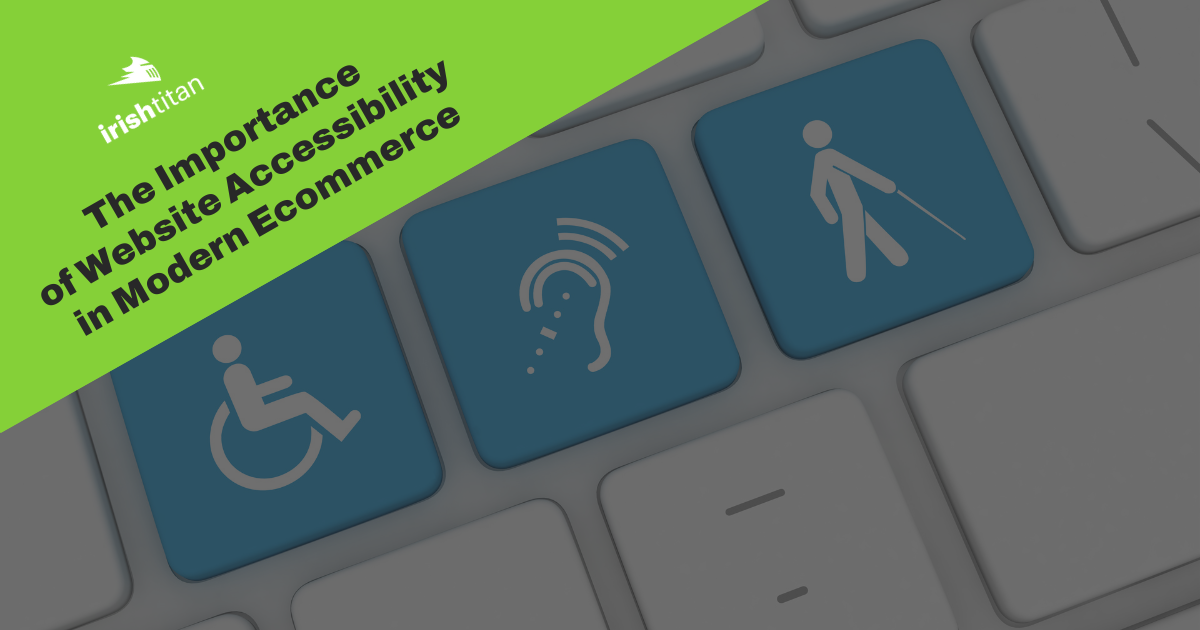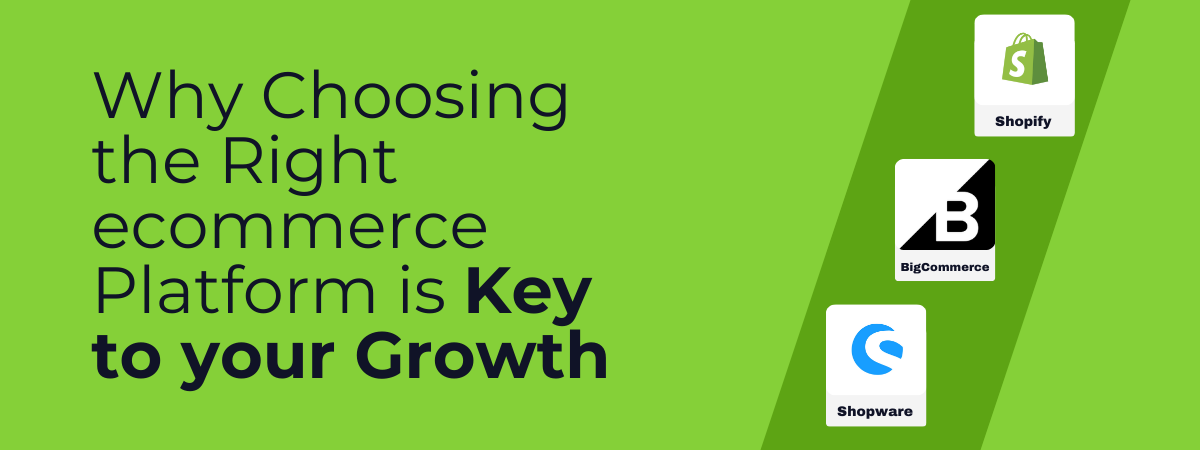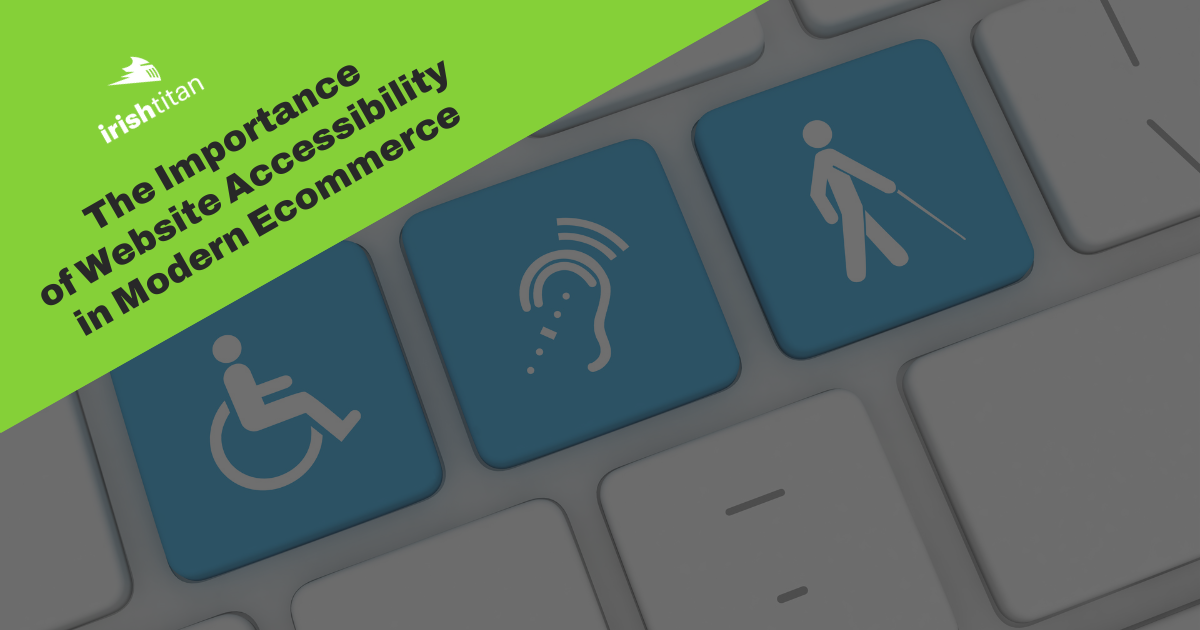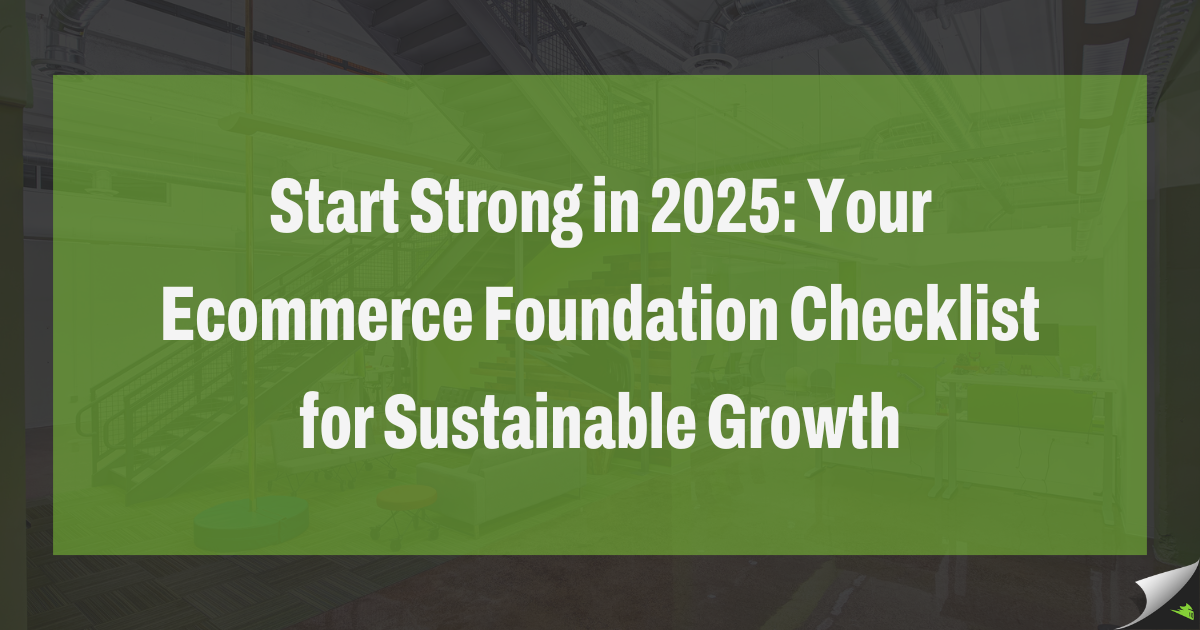Why Choosing the Right Ecommerce Platform is Key to Growth
Your ecommerce platform is the nucleus of your business and choosing the right platform for your website is the essential nutrient for longevity and growth of your business. Choosing the right platform can either make or break your business as this decision directly impacts the scalability, operational efficiency, customer experience and adaptability to the ever changing ecommerce world.
Whether you are currently satisfied with your e-commerce platform or curious about replatforming, it's always important to make it a point to evaluate the current and future needs of your business and whether or not the platform you choose or using aligns with those needs.
Because a decision like this is crucial for your long-term success we are here to breakdown a comparison of the 3 most popular ecommerce platforms we work with so you can visually see the alignment of each platform to your business. With a focus on scalability, integrations, flexibility and customizations. Lets break down how Shopify, BigCommerce and Shopware can be the foundation of your online business and help you grow without interruptions and provide a seamless experience for you customers. Each platform meets you where you are at, and has room for growth in their own ways. If you are curious about one or more of these platforms after reading through, we are here to help you divide what foundation would be best for your business through our partnerships and expertise with each platform.
Before diving into platform comparisons, let’s define some key terms: scalability, integrations, flexibility, and customizations. These factors are the backbone of choosing the right eCommerce platform for your business.
Scalability: This means your platform can handle increased traffic, products, and sales as your business grows, ensuring a seamless, high-quality customer experience. A scalable platform should:
- Maintain fast load times and uptime during peak traffic.
- Support expanding product catalogs and complex inventory needs.
- Adapt to new markets, including multi-channel, multi-language, and region-specific tax and compliance requirements.
- Integrate seamlessly with tools like ERPs, CRMs, and payment gateways to manage growing operational complexity.
- Scale cost-effectively without the need for a complete platform overhaul.
Integrations: The ability to connect your platform with essential tools, from ERP and CRM systems to payment gateways and marketing tools, is a game-changer. Strong integration capabilities streamline operations, enhance customer experiences, and support efficient, cost-effective growth.
Flexibility and Customizations: As your business evolves, your platform should adapt with you. The right platform allows for tailored solutions that align with your unique needs and growth trajectory.
- Flexibility: ensures your platform evolves as your business does. A flexible platform supports tailored solutions that align with your unique needs, whether you’re expanding product lines, entering new markets, or shifting sales strategies. It enables multi-channel selling, custom features like subscriptions, and adaptable workflows
- Customizations: allow you to design a personalized customer experience, from unique layouts to custom checkout flows, and integrate backend processes like ERPs and CRMs. Platforms with robust APIs and developer tools enable you to build and refine features to meet your specific business needs.
Now that we’ve set the stage, let’s dive into the platform breakdown. There’s no one-size-fits-all solution. The right platform for you depends on where your business is now—and where you plan to take it. Shopify is best suited for small to medium-sized businesses looking for ease of use and flexibility, while BigCommerce caters to medium-to-enterprise businesses seeking robust built-in features. Shopware is ideal for businesses that need high customization without the challenges of fully open-source platforms, making it a great choice for medium-to-enterprise companies with complex needs.
Ultimately, the platform you choose should lay the right foundation for your business's growth, helping you scale with ease and adapt to whatever changes lie ahead.
Scalability:
Shopify
Shopify offers excellent scalability, particularly with its Shopify Plus plan, which provides robust infrastructure to handle enterprise-level growth. While Shopify excels at scaling with minimal complexity, it does have limitations when it comes to highly customized environments. As businesses expand and require more advanced customizations, they may need to rely on third-party apps or Shopify’s enterprise options.
BigCommerce
BigCommerce is designed with scalability at its core, particularly for businesses that are already in the scaling phase. It offers strong, built-in features to support large-scale operations without needing third-party apps. The platform’s focus is on delivering robust scalability without relying on external solutions, though it may require custom development for highly specific needs due to its smaller app ecosystem.
Shopware
Shopware shines in scalability, especially for businesses with complex integration needs and custom requirements. Its open-source architecture offers flexibility, allowing for tailored solutions. While the platform is ideal for businesses requiring extensive customizations, its high level of scalability comes with the need for greater technical expertise to manage and implement those custom solutions effectively.
Platform Comparison:
| Feature | Shopify | BigCommerce | Shopware |
|---|---|---|---|
| General Scalability | Ideal for small to medium-sized businesses; Shopify Plus supports enterprise-level scaling. | Designed for mid-sized to enterprise businesses, with no limits on product catalog or sales volume. | Built for large, complex businesses with modular scalability. |
| Traffic Scalability | Handles up to 4 million hits per second on Shopify Plus; auto-scaling servers handle traffic spikes. | Handles unlimited traffic with advanced infrastructure to ensure uptime during peak times (e.g., Black Friday). | Scales for millions of transactions, with enterprise editions handling large traffic loads. |
| Product Catalog Management | Supports up to 100,000 SKUs; third-party tools may be needed for bulk uploads | Supports unlimited SKUs with native handling for large catalogs. | Optimized for large catalogs, supporting unlimited SKUs and flexible category management. |
| API and Integration | Shopify’s APIs handle 40 API calls per second; advanced integrations require Shopify Plus or apps. | Open API with 400 API calls per second, with strong integration capabilities for ERPs and CRMs | Open API-first approach supports unlimited API calls based on hosting specs, ideal for custom integrations. |
| International Expansion | Multi-currency support with app dependencies; multilingual stores require apps like Langify. | Built-in multi-currency and multi-language support with advanced tax rules for international regions. | Native support for multi-store, multi-language, and complex tax setups, with strong EU regulation compliance. |
| Infrastructure and Hosting | Fully managed SaaS with 99.9% uptime; CDN for fast page loads | SaaS platform with Google Cloud infrastructure and CDN for fast, reliable performance. | Offers both self-hosted and cloud options with enterprise-grade hosting that ensures scalability. |
Summary:
All three platforms—Shopify, BigCommerce, and Shopware—offer solid scalability, but each has its strengths and considerations:
- Shopify is highly scalable, especially with the Plus plan, but may require third-party apps for advanced customizations as businesses grow.
- BigCommerce stands out for its built-in scalability features and focus on large-scale operations, though its smaller app ecosystem may require custom development for specific needs.
- Shopware excels in handling complex, customized solutions with its open-source architecture, but it demands higher technical expertise to manage its scalable, robust integrations.
Each platform offers scalability, but the choice will depend on your specific needs, such as customization complexity, budget, and technical resources.
Integrations:
Integrations play a pivotal role in the functionality of a business, impacting not only the customer experience on your website but also the entire operational ecosystem. Each platform offers its own approach to integrations, catering to different business needs and technical capabilities.
Shopify
Shopify boasts an extensive app marketplace that makes it easy to integrate with a wide range of third-party applications. While this gives businesses access to numerous tools for enhancing their operations, the reliance on apps can become costly over time. Shopify supports both API connections and custom app development, making it a good choice for businesses that need quick, plug-and-play solutions. However, its integration flexibility is limited when it comes to deep customizations or complex integrations, especially in comparison to BigCommerce and Shopware.
BigCommerce
BigCommerce offers an open API and a marketplace for third-party apps, but it also emphasizes its built-in capabilities for integrations, reducing the need for external applications. It supports seamless omnichannel selling and multi-channel marketplace integrations, making it an excellent choice for businesses focused on scaling across platforms. However, with fewer third-party apps available, businesses may find themselves relying on custom development to meet specific needs. Despite this, BigCommerce offers a robust API-first approach that makes it easy to integrate with ERP, CRM, and other business tools without excessive reliance on external apps.
Shopware
Shopware’s API-first approach gives businesses maximum flexibility when it comes to custom integrations. It is designed for complex, highly customizable environments and can handle deep integrations with ERP systems, CRMs, and other third-party tools. While Shopware excels in offering highly tailored solutions for businesses with specialized needs, it comes at the cost of requiring significant technical expertise to implement and manage these integrations.
Platform Comparison:
| Feature | Shopify | BigCommerce | Shopware |
|---|---|---|---|
| Omnichannel Selling | Built-in tools for B2C and B2B, with third-party apps for extensions. | Multi-channel selling and marketplace integration built-in. | Supports omnichannel selling with custom integrations. |
| API Approach | API capabilities with reliance on apps for deep customization. | Open API-first approach, reducing need for external apps. | Fully API-first approach, ideal for complex integrations. |
| Built-In Features | Shopify Payments, Headless support, Solid SEO features. | Multi-channel selling, Advanced ERP + CRM integration, SEO. | Deep integration with ERP, CRM, and third-party extensions. |
| Ease of Use | Plug-and-play apps make integrations easy for non-technical users. | Strong built-in integrations for ease of use without relying on apps | Highly customizable but requires technical knowledge to implement. |
| Customizations | Limited deep customizations without third-party apps. | Custom solutions may require development but are less reliant on apps | Extreme flexibility for custom integrations but requires developers. |
Summary:
- Shopify is known for its wide selection of apps, making it a go-to for businesses seeking straightforward integrations. However, the reliance on third-party apps can become costly as businesses scale.
- BigCommerce stands out for its focus on built-in features and less dependence on third-party apps, making it ideal for businesses that want strong multi-channel capabilities without the added costs of additional apps. However, the smaller app marketplace means that businesses may sometimes need to rely on custom development.
- Shopware offers unparalleled flexibility for businesses with complex needs, supporting deep custom integrations through its API-first architecture. However, it requires a higher level of technical expertise to fully leverage its integration capabilities.
Concluding that, each platform supports third-party integrations, APIs, and popular tools for SEO, marketing, and analytics. The best choice depends on your business’s specific needs: Shopify for ease of use and a wide app selection, BigCommerce for multi-channel and enterprise integrations with fewer third-party dependencies, and Shopware for deep, complex integrations requiring technical expertise.
Flexibility & Customizations:
Flexibility and customization are integral to the scalability of any platform, as they determine how well a platform can adapt to evolving business needs. As noted earlier, Shopify offers limited customization without apps or code, BigCommerce provides robust built-in features with some coding requirements, and Shopware is highly developer-friendly, offering extensive customization options.
In terms of design functionality, Shopify and BigCommerce both offer over 100 polished themes—paid and free—but with differing levels of customization. Shopify allows limited customizations with its themes, while BigCommerce provides more flexibility for developers to modify templates using HTML, CSS, and JavaScript. Shopware, on the other hand, offers fewer built-in templates but gives developers full control to create custom designs.
Platform Comparison:
| Feature | Shopify | BigCommerce | Shopware |
|---|---|---|---|
| Ease of Use | User-friendly, ideal for businesses without technical expertise. | Easy to use but with more flexibility for developers. | Requires development expertise but offers the highest level of customization. |
| Design Customization | Offers over 100 themes with some customization via a visual editor or Liquid code (for more complex changes). | Provides customizable templates with HTML, CSS, and JavaScript. | Limited built-in templates but full freedom to create custom designs via code. |
| Backend Customization | Limited backend flexibility, often requiring third-party apps or API work for custom features | More backend customization than Shopify, supporting custom workflows and integrations through APIs | Open-source, providing full access to the backend for deep customization. |
| Developer Control | Customizations require working with Liquid code or Shopify Plus for more flexibility. | Developers can create custom integrations, workflows, and features with more freedom. | Highly developer-friendly, with advanced tools for custom features, workflows, and integrations |
| App Ecosystem | Access to a vast array of apps to extend platform functionality, including CRMs, ERPs, and marketing tools. | Robust built-in integrations for multi-channel selling but fewer third-party apps available. | Highly customizable, but relies on custom development for complex workflows or integrations. |
| Multi-Channel Integration | Supports integration with popular channels but relies on apps for some multi-channel functionalities. | Seamless multi-channel integrations with platforms like Amazon, eBay, and social media out of the box. | Strong support for multi-channel selling and international scalability, requiring custom development for advanced features. |
| Custom Pricing & Workflows | Limited to custom apps for complex pricing or subscription models. | Flexible pricing options including tiered pricing, customer-specific pricing, and subscriptions. | Fully customizable pricing models and workflows tailored to specific business needs. |
Summary:
- Shopify excels in ease of use, offering a wide variety of polished themes and user-friendly customization options. However, deeper customizations, especially on the backend, often require third-party apps or technical expertise.
- BigCommerce provides greater backend flexibility and more control over templates compared to Shopify, along with built-in features for multi-channel selling. While it requires less reliance on third-party apps, businesses may need to use custom development for complex needs.
- Shopware offers the highest level of flexibility, especially for businesses with complex requirements. Its open-source nature gives developers full control over both front-end and back-end customizations, but it does demand technical expertise to fully leverage its potential.
In conclusion, the best platform depends on your business's needs: Shopify for ease of use with a wide range of apps, BigCommerce for built-in flexibility with less reliance on apps, and Shopware for deep, customizable solutions that require developer expertise.
Trust us, you’re gonna want this in your inbox.
Join the Irish Titan sphere of influence. We'll send a couple emails a month. No trash, no spam, just the shenanigans we get up to.
More from Ecommerce...

Whether you're managing a small shop or running a large-scale operation, shipping plays a crucial role in your business’s success. But with multiple carriers, complex rate structures, and diverse customer expectations, it can be challenging to provide a shipping process that is both efficient for your business and satisfying for your customers.

In today’s fast-paced digital world, inclusivity isn’t just a trend—it’s a necessity. For ecommerce businesses, ensuring website accessibility is vital not only for regulatory compliance but also for delivering a seamless experience to all users, including those with disabilities. Accessible websites help expand your audience, enhance brand reputation, and boost conversions

As we continue to dive into the new year, it’s the perfect time to focus on building a strong ecommerce foundation to position your business for long-term success. At Irish Titan, we know scaling an ecommerce business comes with unique challenges—and we’re here to guide you through them with confidence.





